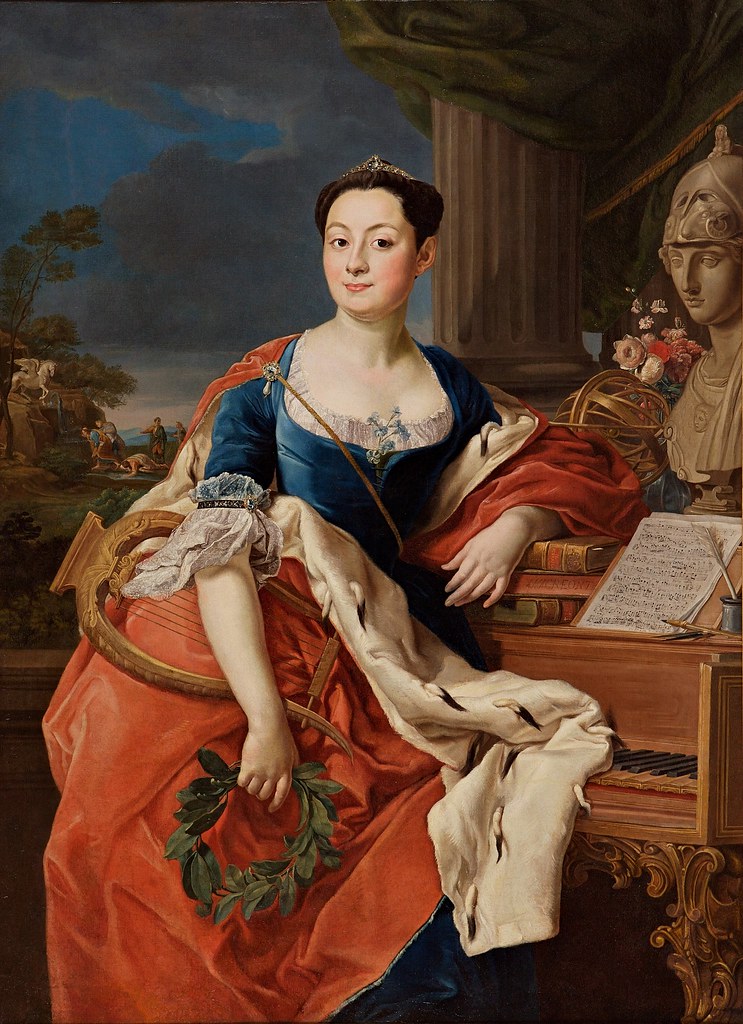Francesco Durante (1684-1755)
- Concerto (in Si bemolle maggiore) Per Cembalo con VV.ni e Basso
Performers: Antonеlla Cristiаno (pianoforte); I Solisti Pаrtеnopеi; Ivаno Cаiаzzа (conductor)
Painting: Pompeo Batoni (1708-1787) - Portrait of Princess Giacinta Orsini Buoncampagni Ludovisi (c.1758)
Further info: Francesco Durante (1684-1755) - Missa Pastorale
---
Italian composer. He was the seventh of 11 children of Gaetano Durante
and Orsola Capasso. His father, a woolcomber, served as sexton and
singer at S Maria degli Angeli e S Sossio, Frattamaggiore, where he and
his wife had married on 31 October 1674 and where all their children
were baptized. His uncle, Don Angelo Durante (c.1650-after 1704), was a
priest and musician who in 1690 succeeded Cristoforo Caresana as primo
maestro of the Neapolitan Conservatorio di S Onofrio a Capuana, of which
he was rector until 1699. Nothing is known of Francesco’s education
until after his father’s death on 18 March 1699, when his uncle took
over his musical training. Don Angelo left Naples to assist his widowed
sister-in-law and her children, and Nicola Sabini assumed his duties at
the conservatory; but in 1702 he returned to his post at S Onofrio and
Francesco enrolled as a convittore to study with his uncle and the
violinist Gaetano Francone. Three years later Francesco left the
conservatory, and on 13 June 1705 his first known creative effort, a
scherzo drammatico entitled Prodigii della divina misericordia verso I
devoti del glorioso S Antonio di Padova, was performed in Naples. Little
is known about Durante’s life between then and 1728, when he was
appointed primo maestro of the Neapolitan Conservatorio dei Poveri di
Gesù Cristo. Choron and Fayolle (1810) stated that he studied with
Pasquini and Pitoni in Rome for five years, and although that was later
disavowed (by Villarosa and Florimo), circumstantial evidence seems to
support them. Girolamo Chiti, in a letter to Padre Martini of 10
September 1746, identified Durante as a ‘scolaro di Pitoni’. Durante
could have been in Rome either between 1705 and 1710, which would have
allowed studies with Pasquini (who died in 1710), or between 1711 and
1719. The only dated composition by Durante from the first period, his
Missa S Ildefonsi of 1709, could have been written for the Spanish
church in Rome or Naples. By July 1710 he was in Naples, where he began
teaching at the Conservatorio di S Onofrio.
He remained there for only six months, leaving the institution on 12
January 1711, perhaps to return to Rome or to study there with Pitoni
for the first time. He was, however, in Naples on 4 January 1714, when
he married Orsola de Laurentis, 12 years his senior, and is certain to
have been present in the city at the first performance of his sacred
drama La cerva assetata ovvero L’anima nelle fiamme on 18 February 1719.
Thereafter, nothing is known of Durante’s whereabouts until 1728. In
October 1728 the governors of the Conservatorio dei Poveri di Gesù
Cristo appointed Durante, now aged 44, primo maestro replacing the
elderly Gaetano Greco: his election attests to his high reputation.
After ten years of service, Durante resigned from the conservatory, and
in September 1739 he was succeeded by Francesco Feo. The reasons for his
resignation are unknown, and there is no information about his
activities until 1742, when he was called to the Neapolitan
Conservatorio di S Maria di Loreto. This oldest and largest of the four
Neapolitan conservatories had been without a primo maestro since October
1741, when Porpora went on leave to Venice and did not return; with the
death of Giovanni Veneziano on 13 April 1742 it had lost its secondo
maestro. On 25 April 1742 the governors elected Durante primo maestro,
at the same time appointing P.A. Gallo to assist him as secondo maestro.
Under Durante’s directorship the Loreto conservatory regained stability
and quality of education. During his 13 years’ service such later
masters as Pasquale Anfossi, Tommaso Traetta, Pietro Guglielmi,
Alessandro Speranza, Antonio Sacchini and Fedele Fenaroli received their
musical education there. Durante continued to hold his positions at
both S Maria di Loreto and S Onofrio, and during the last ten years of
his life was venerated as the most distinguished of all Neapolitan
teachers. According to tradition Nicolo Piccinni became Durante’s
favourite pupil, of whom he is supposed to have said: ‘The others are my
pupils, but Nicolo alone is my son’. He was buried in S Lorenzo
Maggiore in Naples.

Cap comentari:
Publica un comentari a l'entrada